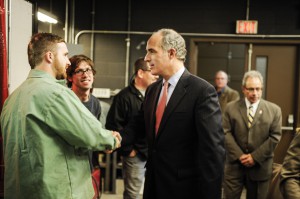Jobs Today: Cures Tomorrow—Innovation and the Biopharmaceutical Industry
Click here to view the full report.
Click here to view the executive summary.
Executive Summary
Our nation’s biopharmaceutical industry is vital to the personal health of our people and the economic health of our country. At the current time, and in the current political and regulatory environment, we are at the edge of a precipice: We can either adjust our policies and remain the international leader in biopharmaceutical development and manufacturing, or we can watch the industry move overseas, like so many before it. It is a harsh reality, but one that is simultaneously rife with opportunity.
The unions and companies of the Pharmaceutical Industry Labor-Management Association (PILMA) recognize that, especially in the current economy, America needs a sustainable and growing biopharmaceutical industry. Directly and indirectly, our industry supports jobs for 3.2 million people in all 50 states. But, without changes to our national industry-related policies, these jobs may ultimately leave the U.S. to relocate in other countries, where environments are friendlier.
To be sure, there is no easy fix — a wide variety of policies has contributed to where we are today, and a wide variety of reforms will be required to ensure the American biopharmaceutical industry’s continued preeminence. Policies include tax regulations, intellectual property rights, economic and trade policies, patent laws and data exclusivity, importation laws, and education programs, to name a few.
Challenges & Opportunities
America’s position in the world market has slowly eroded over many years, and other countries, like China and India, are standing by to pick up the slack by making significant investments in talent, infrastructure and research. But, as we know, our nation never fights harder or wins more than when it’s facing a second-place finish. That’s why, in many ways, this is an opportunity.
First and foremost, we must prevent other countries from using their friendlier economic and tax policies to entice American biopharmaceutical companies to their shores. Because we are in an environment where tax revenues are a central focus of policymakers, we must, at least, guard against tax policies that would diminish our already fragile competitive position. We believe America’s global leadership position will be in danger unless we establish policies that encourage sustained innovation and growth.
Medical innovations in general and biopharmaceutical advancements in particular, have traditionally been drivers in the knowledge-based economy. The U.S. remains the global leader in biopharmaceutical development, in part because of the American biopharmaceutical industry’s research and development achievements, but also because American biotechnology employment represents more than half of all such jobs worldwide. Indeed, the vast majority of global biopharmaceutical R&D investment is domestic. Clearly, if steps aren’t taken to maintain this leadership position, however, good jobs and the health of the American people are at stake.
Economics & Trade
While the biopharmaceutical research industry is firmly positioned to continue its contribution to America’s economic growth and health, other countries are offering strong challenges to America’s preeminence. Other countries’ dramatic growth can be inferred from their domestic research and development expenditures, their share of new U.S. patents, and the number of new doctorates in science and engineering being awarded to their citizens. A recent study found that the U.S. ranked last among 40 countries and regions when it comes to progress made over the last decade toward the “new knowledge-based innovation economy.” In terms of overall competitiveness, the study ranks America sixth, behind Singapore, Sweden, Luxemburg, Denmark and South Korea.
Our laws and regulations must be updated to match the complex nature of new products being developed. Traditional patent and data exclusivity protections, for example, are no longer sufficient to protect the intellectual property of innovators. At the same time, ongoing threats to intellectual property protection – in the form of legislation, court decisions, and more – could potentially undermine the value of patents in the future. In order to foster continued development and ensure the right incentives for innovation, manufacturers in the research-intensive biopharmaceutical sector must be able to rely on the certainty afforded to them through strong and enforced legal protections.
Next, we must fight even harder to prevent illegally imported medicines from entering our national drug supply. There are serious, well-documented concerns related to the quality, safety and efficacy of these unregulated, often counterfeit biopharmaceuticals. We must protect our drug supply just as vigilantly as we do our water supply, because contamination of either could mean a major national health problem. Additionally, the counterfeit drug industry is estimated to cost hundreds of thousands of legitimate jobs annually.
Americans must also insist on free trade that is fair trade. Trade policies are major determinants of the competitiveness of America’s biopharmaceutical industry. We cannot allow the continuation of the trade policies that have hampered, and ultimately destroyed, other industries, such as steel, automobiles, and textiles.
We have the opportunity to create jobs and strengthen U.S. global competitiveness by both promoting and expanding biopharmaceutical industry investment in research and development and manufacturing in America. To do that, we need to ensure that we institute tax policies that improve incentives for companies to undertake the unpredictable and expensive process that leads to the creation of tomorrow’s therapeutic breakthroughs. And, simultaneously, we must renew efforts to make sure America has fostered the talent to research, discover and manufacture biopharmaceutical innovations well into the future. This can be achieved by addressing the full formal education pipeline in science, technology, engineering and mathematics from kindergarten through 12th grade, in vocational/technical schools, labor/management training, college, and graduate university programs.
The Obama Administration has already launched many of the starting initiatives to accomplish these long-term aims. The administration has set a goal of doubling America’s exports over the next five years, and called for boosting investments in R&D, increasing funding for biomedical research, investing in the next generation of scientists and engineers, and creating a national infrastructure-innovation and -finance fund.
JOBS RIGHT NOW: Hope for Tomorrow
While we have these opportunities to strengthen our international leadership position, fight off our competitors, and create new jobs for thousands of people, we cannot forget that our country’s biopharmaceutical industry exists with one person in mind: the patient. As referenced by the Congressional Budget Office (CBO), “Many examples exist of major therapeutic gains achieved by the industry in recent years … anecdotal and statistical evidence suggests that the rapid increases that have been observed in drug‐related R&D spending have been accompanied by major therapeutic gains in available drug treatments.” This research and these jobs translate into better patient outcomes.
We work every day to develop treatments that reduce the need for hospitalizations, lessen the length and intensity of rehabilitations, and potentially even save lives. But, perhaps most importantly, we — as an industry — provide hope for patients whose lives depend upon our discovering breakthrough treatments, and we must remain mindful of preserving, and even improving, patients’ access to them. Imagine a world where smart anti-cancer therapeutics will kill cancer cells and leave their normal neighbors untouched, or where nanotechnology will deliver drugs precisely to the desired tissue. That world is not too far in the distant future. Surely our nation can move on from today’s economic challenges, but we cannot forget the importance of protecting Americans’ health care and quality of life.

 September 10, 2010—PILMA, in conjunction with We Work For Health, co-sponsored a September 10th visit by Pennsylvania Sen. Bob Casey to Sheet Metal Workers Local 19 Joint Apprenticeship & Training Center in Philadelphia. The session showcased the strategic partnership between the biotechnology industry and labor for some 35 biotech professionals and representatives from PILMA’s labor and industry partners—including SMWIA, GlaxoSmithKline, Endo Pharmaceuticals and Pfizer.
September 10, 2010—PILMA, in conjunction with We Work For Health, co-sponsored a September 10th visit by Pennsylvania Sen. Bob Casey to Sheet Metal Workers Local 19 Joint Apprenticeship & Training Center in Philadelphia. The session showcased the strategic partnership between the biotechnology industry and labor for some 35 biotech professionals and representatives from PILMA’s labor and industry partners—including SMWIA, GlaxoSmithKline, Endo Pharmaceuticals and Pfizer.
